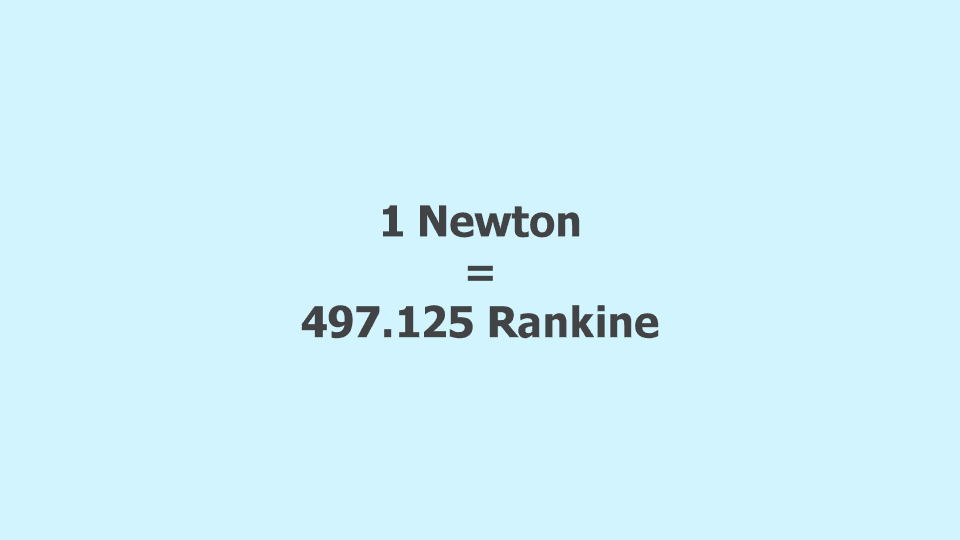Convert Newton (°N) to Rankine (°R)
Please provide values below to convert Newton (°N) to Rankine (°R).Temperature Converter
Convert from
Convert to
**Formula:
Discover Other Unit Converters
Try Other Temperature Converters
Celsius to FahrenheitCelsius to KelvinCelsius to RankineCelsius to DelisleCelsius to NewtonCelsius to ReaumurFahrenheit to CelsiusFahrenheit to KelvinFahrenheit to RankineFahrenheit to DelisleFahrenheit to NewtonFahrenheit to ReaumurKelvin to CelsiusKelvin to FahrenheitKelvin to RankineKelvin to Delisle
Updated on December 1, 2025
You can use our Newton (°N) to Rankine (°R) conversion calculator as a reliable and efficient tool to simplify temperature conversions. It is designed for professionals, students, and anyone who needs a quick and accurate result. Conversion of Newton (°N) to Rankine (°R) is crucial in Early physics experiments, Thermal research and calibration related measurements. You can avoid the risk of manual calculation errors and save valuable time using our Newton (°N) to Rankine (°R) converter.About Newton (°N) to Rankine (°R) Conversion Calculator
Written By Nadiba Rahman
Nadiba Rahman
Reviewed by Mrinmoy Roy
Mrinmoy Roy
Share This Post
URL copied!
Relation Between Newton (°N) and Rankine (°R)
Let me explain to you about the relation between Newton °N and Rankine (°R) first before moving to the conversion process. Because it’s essential to grasp what these units represent.What is Newton (°N)?
Newton is a temperature scale using Celsius-based degrees, with 0°N at the freezing point of water and increasing proportionally to the Celsius scale. Newton (°N) is a unit of temperature measurement which is commonly used in Early physics experiments, Thermal research and calibration. The Newton scale was used in early scientific research and experimentation, primarily in Europe, but is now of historical significance only..What is Rankine (°R)?
Newton (°N) is another unit of temperature measurement that is used in Thermodynamics. Rankine is an absolute temperature scale, where zero degrees Rankine is absolute zero.. The Newton scale was used in early scientific research and experimentation, primarily in Europe, but is now of historical significance only..How to Convert Rankine (°R)?
The conversion between Newton (°N) and Rankine (°R) follows a simple formula:Rankine (°R) = newton * 60 / 11 + 491.67 (°R)
Newton (°N) = (rankine - 491.67) * 11 / 60 (°N)
Where, newton * 60 / 11 + 491.67 and (rankine - 491.67) * 11 / 60 is the value that allows you to convert between Newton (°N) and Rankine (°R).
So,
1 Rankine = -89.95616666666666 (°N)
And, 1 Newton = 497.12454545454545 (°R)

Examples of Converting Newton (°N) to Rankine (°R)
To convert any value from Newton (°N) to Rankine (°R), simply multiply the amount of Newton (°N) by the conversion factor:1 Rankine (°R) = -89.95616666666666 Newton (°N)
For example, if you want to convert 5 Newton into Rankine and the conversion formula is (newton * 60 / 11 + 491.67), then:
5 Newton (°N) = 518.9427272727273 Rankine (°R)
Newton (°N) to Rankine (°R) Conversion Chart
Here’s a quick reference chart for common conversions between Newton (°N) and Rankine (°R)| Newton (°N) | Rankine (°R) |
|---|---|
| 10 Newton (°N) | 546.2154545454546 Rankine (°R) |
| 20 Newton (°N) | 600.7609090909091 Rankine (°R) |
| 30 Newton (°N) | 655.3063636363636 Rankine (°R) |
| 40 Newton (°N) | 709.8518181818182 Rankine (°R) |
| 50 Newton (°N) | 764.3972727272727 Rankine (°R) |
| 60 Newton (°N) | 818.9427272727273 Rankine (°R) |
| 70 Newton (°N) | 873.4881818181818 Rankine (°R) |
| 80 Newton (°N) | 928.0336363636363 Rankine (°R) |
| 90 Newton (°N) | 982.5790909090908 Rankine (°R) |
| 100 Newton (°N) | 1037.1245454545453 Rankine (°R) |
How 1 Newton (°N) Converts to Other temperature Units
See the relation between Newton (°N) and other temperature related measurement units:| 1 Newton(°N) | 3.030303 Celsius (°C) |
| 1 Newton(°N) | 37.454545 Fahrenheit (°F) |
| 1 Newton(°N) | 276.180303 Kelvin (K) |
| 1 Newton(°N) | 497.124545 Rankine (°R) |
| 1 Newton(°N) | 2.424242 Réaumur (°Re) |
| 1 Newton(°N) | 145.454545 Delisle (°De) |
Features of Our Newton (°N) to Rankine (°R) Conversion Calculator
Our Newton °N to Rankine (°R) converter is more than just a basic converter. Here's what makes it stand out:Output Precision Control
You can control how precise your conversion results are. From settings, you can adjust decimal places from 0 to 12 places.Customizable Rounding Options
You can control the output rounding options based on your necessity. You can turn the rounding mode on or off, and select between Ceiling or Floor rounding to match your needs.Multiple Number Formats
Display your results the way you want:- Standard format (e.g. 12.345245)
- Scientific notation (e.g. 1.23452e+1)
- Engineering format (e.g. 1.23452 × 10^1)

